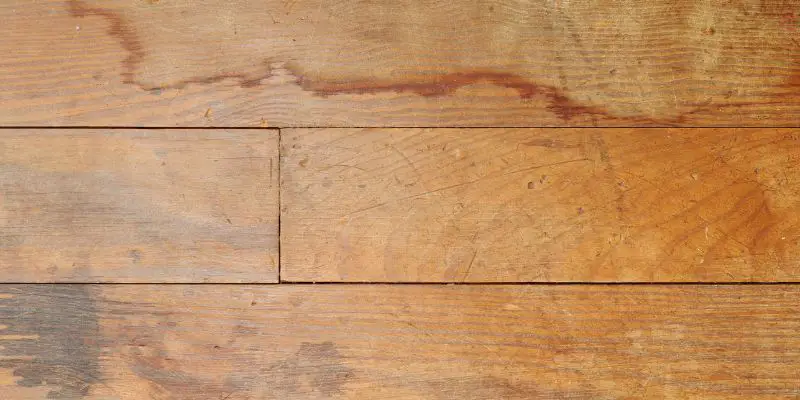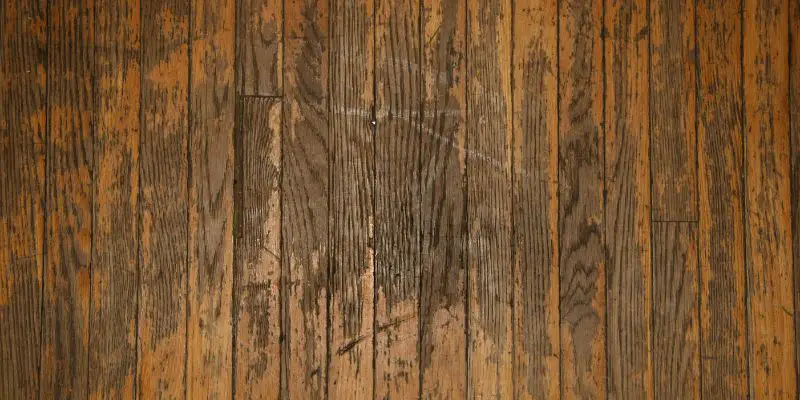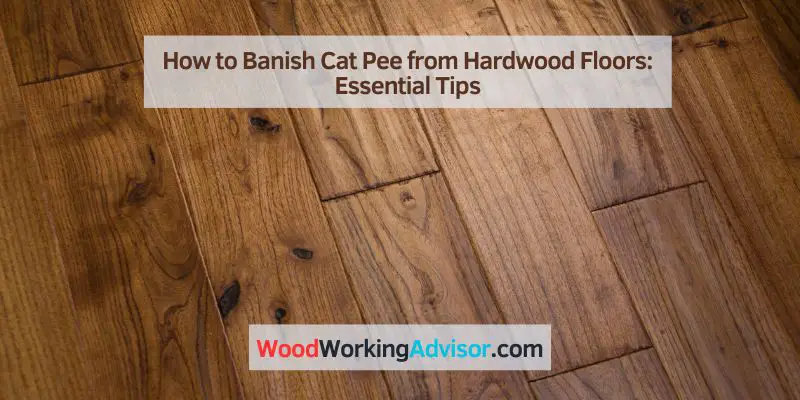To remove cat pee from hardwood floors, blot up the urine with paper towels and then clean the area with a mixture of white vinegar and water.
Understanding The Problem
Learn effective methods for removing cat urine stains and odors from hardwood floors. Discover step-by-step instructions for tackling this common problem and restoring the beauty of your floors.
Consequences Of Leaving Cat Pee On Hardwood Floors
Understanding the problem of cat pee on hardwood floors is crucial before you can effectively tackle the issue. When left unaddressed, cat urine can not only stain and damage the hardwood surface, but it can also result in a lingering odor that is hard to eliminate. Identifying the causes of cat pee on hardwood floors and being aware of the consequences of not taking immediate action is the first step towards finding a solution.

Identifying The Causes Of Cat Pee On Hardwood Floors
There can be several reasons why your furry friend may be leaving their mark on your hardwood floors. It’s important to identify these causes to prevent future accidents and effectively remove any existing stains and odors from your floors.
1. Marking territory: Cats are known for their instinct to mark their territory. If your cat is not properly trained or feels threatened by new scents or objects in the environment, they may resort to urinating on your hardwood floors as a way of establishing their presence.
2. Behavioral issues: Cats may sometimes urinate outside their litter box due to stress, anxiety, or underlying health issues. Identifying and addressing these behavioral factors can help minimize accidents on your hardwood floors.
3. Litter box problems: Ensure that your cat’s litter box is clean and easily accessible. Cats can develop aversions to their litter box and may opt to relieve themselves elsewhere, such as your hardwood floors.
Consequences Of Leaving Cat Pee On Hardwood Floors
Leaving cat pee on hardwood floors untreated can have detrimental effects, both aesthetically and health-wise. It’s crucial to understand the consequences to motivate prompt action and prevent further damage.
1. Stains and discoloration: Cat urine contains ammonia, which can discolor and stain hardwood floors. If left for prolonged periods, these stains can become permanent, diminishing the visual appeal of your flooring.
2. Odor retention: Cat urine has a strong, distinctive odor that can be persistent and difficult to eliminate. The longer cat pee is left unaddressed, the harder it becomes to completely eradicate the odor from your hardwood floors.
3. Structural damage: Cat urine, if not promptly cleaned, can seep into the hardwood boards and cause damage to the flooring structure. This can weaken the wood, leading to buckling, warping, and costly repairs or even replacement.
To remove cat pee from hardwood floors effectively and prevent these consequences, it’s essential to take immediate action and follow the right cleaning methods. In the following sections, we will explore various strategies to help you tackle this problem and restore the beauty and integrity of your hardwood floors.
Prevention And Regular Maintenance
When it comes to keeping your hardwood floors free from cat pee, prevention and regular maintenance are key. By implementing a few simple strategies, you can save yourself the hassle of dealing with the pungent odor and potential damage caused by feline accidents. In this section, we’ll explore the importance of maintaining a clean litter box, using positive reinforcement for litter box usage, and regular floor cleaning and maintenance.
Maintaining A Clean Litter Box
A clean litter box is not only essential for your cat’s hygiene and well-being but also helps prevent them from seeking alternative places to relieve themselves, such as your hardwood floors. Take the time to scoop and clean the litter box at least once a day, removing any clumps or waste that may accumulate. Additionally, consider replacing the litter entirely every few weeks to ensure freshness and cleanliness. Cats are known for their cleanliness, and a clean litter box will encourage them to use it.
Positive Reinforcement For Using The Litter Box
Positive reinforcement is a powerful tool that can be used to encourage your cat to consistently use the litter box. When your cat successfully uses the litter box, offer verbal praise, petting, or even a treat as a reward. Create a positive association for your cat with the litter box, making it a place that they feel comfortable and rewarded for using. This positive reinforcement approach can help prevent accidents on your hardwood floors and reinforce the desired behavior.
Regular Floor Cleaning And Maintenance
Regular cleaning and maintenance of your hardwood floors is essential to remove any lingering odors and prevent damage. Here are a few tips to help you maintain your floors:
- Start by wiping up any cat pee accidents as soon as you discover them. Use a paper towel or cloth to blot the area, being careful not to rub the urine into the wood.
- Next, clean the affected area thoroughly with a mixture of warm water and a mild detergent. Avoid using harsh chemicals that could damage the finish of your floors.
- Dry the area completely with a clean towel or allow it to air dry naturally.
- For lingering odors, you can try using enzymatic cleaners specifically designed to break down pet urine. These cleaners help eliminate the odor-causing bacteria, leaving your hardwood floors smelling fresh and clean.
- Lastly, consider using protective mats or rugs in areas where your cat may be more prone to accidents. These mats can help catch any spills or accidents and protect your hardwood floors underneath.
By implementing these preventative strategies and performing regular maintenance, you can minimize the chances of cat pee accidents on your hardwood floors. Remember to maintain a clean litter box, use positive reinforcement to encourage litter box usage, and clean any accidents promptly to ensure the longevity and beauty of your hardwood floors.
Effective Methods For Removing Cat Pee
Dealing with cat pee on your beautiful hardwood floors can be not only frustrating but also challenging to remove. However, with the right methods and tools, you can effectively eliminate the stains and odor, restoring the pristine condition of your flooring. In this article, we will explore some of the most effective methods for removing cat pee from hardwood floors, including acting quickly to remove fresh urine stains, using enzymatic cleaners, and opting for natural remedies to combat the lingering odor.
Acting Quickly To Remove Fresh Urine Stains
When it comes to removing cat pee from hardwood floors, speed is key. The faster you act, the better chance you have of preventing the urine from seeping into the wood and causing more damage. Here are a few steps to take when dealing with fresh urine stains:
- Blotting the urine: Start by blotting the affected area with paper towels or a clean cloth to absorb as much urine as possible.
- Rinsing with water: Once you have blotted up the majority of the urine, rinse the stained area with water. Be careful not to saturate the wood as excessive moisture can lead to warping or cupping.
- Drying thoroughly: Finally, ensure the floor is thoroughly dried using a fan or natural airflow. This step helps prevent any remaining urine from leaving a stain or an unpleasant odor.
Using Enzymatic Cleaners
To tackle lingering cat pee stains and odors on hardwood floors, enzymatic cleaners can be highly effective. These specialized cleaners contain enzymes that break down the proteins in cat urine, neutralizing the odor and removing the stain. Follow these steps when using enzymatic cleaners:
- Read the instructions: Begin by carefully reading and following the instructions provided by the cleaner manufacturer.
- Apply the cleaner: Apply the enzymatic cleaner directly to the stained area, ensuring sufficient coverage.
- Allow the cleaner to work: Give the cleaner enough time to work according to the instructions. This usually involves letting it sit for a certain period to allow the enzymes to break down the urine proteins.
- Clean the area: After the recommended time has passed, use a clean cloth or paper towels to blot up the enzymatic cleaner and any remaining urine.

Natural Remedies For Cat Pee Odor
If you prefer to use natural remedies to combat cat pee odor on your hardwood floors, there are several options available. These remedies are not only effective but also safe for both your floors and the environment. Here are a few natural remedies you can try:
- Vinegar and water: Create a mixture of equal parts vinegar and water. Apply it to the affected area and let it sit for a few minutes before wiping it away. Vinegar helps neutralize the odor.
- Baking soda and hydrogen peroxide: Make a paste using baking soda and hydrogen peroxide. Apply the paste to the stain, gently scrub it in, and let it dry. Once dried, vacuum or sweep away the residue.
- Citrus solution: Mix equal parts water and citrus juice or peel. Apply the mixture to the stained area, allowing it to sit for a few minutes before wiping it clean. The natural oils in citrus help eliminate the odor.
By acting quickly, utilizing enzymatic cleaners, and exploring natural remedies, you can effectively remove cat pee stains and odor from your hardwood floors. Remember to test any cleaning solution on a small, inconspicuous area of your floor before applying it to the stain. This ensures compatibility with your flooring and avoids any unwanted damage. With these methods at your disposal, say goodbye to cat pee woes and hello to pristine hardwood floors.
Frequently Asked Questions On How To Remove Cat Pee From Hardwood Floors
Can Cat Urine Smell Be Removed From Wood Floors?
Yes, cat urine smell can be removed from wood floors. Use a mixture of white vinegar and water to clean the affected area. Scrub gently, then rinse with water. Repeat if necessary.
What Draws Cat Urine Out Of Wood?
To eliminate cat urine from wood, use a mixture of white vinegar and water or an enzymatic cleaner specifically designed for pet stains. Apply the solution, let it sit, and then wipe it off. Repeat if necessary to fully remove the odor and stains.
What Gets Pet Urine Out Of Hardwood Floors?
To remove pet urine from hardwood floors, mix equal parts water and white vinegar. Apply the solution to the affected area, scrub gently, then wipe dry. For stubborn stains, use hydrogen peroxide instead. Prevent future accidents by promptly cleaning up messes and using pet-friendly floor cleaners.
How Do I Stop My Cat From Peeing On My Hardwood Floors?
To stop your cat from peeing on hardwood floors, identify the cause, such as a medical issue or anxiety, then address it accordingly. Ensure the litter box is clean and accessible, use deterrents like aluminum foil or citrus scents, and provide vertical scratching surfaces.
Consult a veterinarian or animal behaviorist for further guidance.
Conclusion
In a nutshell, removing cat pee from hardwood floors requires prompt action and the right approach. By following the steps outlined you can effectively eliminate the odor and stains caused by your furry friend. From using household items to specialized cleaners, there are various solutions available.
Remember, patience and consistency are key. With the right technique, you can restore the beauty of your hardwood floors and keep them cat-pee free.



3 thoughts on “How to Banish Cat Pee from Hardwood Floors: Essential Tips”